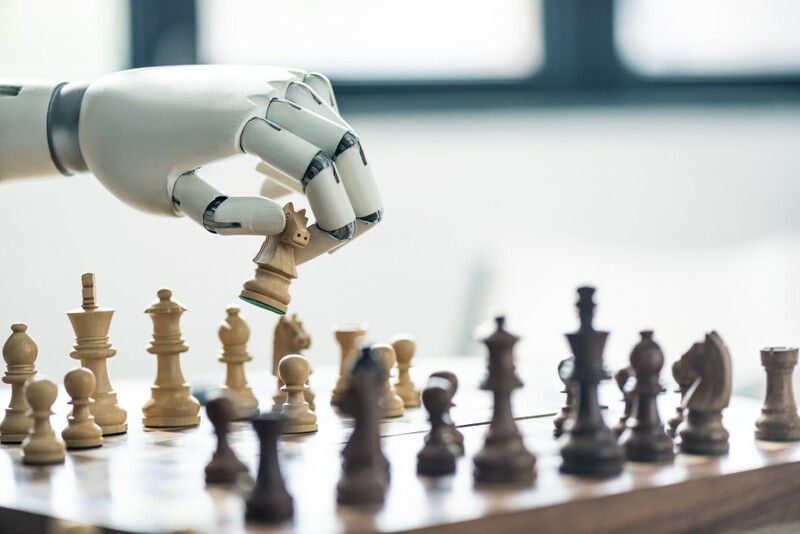One of the hottest topics in technology right now is artificial intelligence (AI), which refers to computer systems designed to mimic human decision-making. Unlike traditional computers, which are essentially just powerful calculators, AI programs can learn for themselves by processing huge amounts of data, identifying patterns, and making predictions.
There are many types of AI, ranging from relatively simple programs like Siri and Alexa that help us find information, to very complex systems like cars that drive themselves. From its roots in early computer technology of the 1950s, AI has made a huge leap — from computer science theory to ubiquitous reality — thanks to recent advances in storage capacity and processing speed of modern computers.
With this rapid development of machines that think like humans, many people are concerned about AI outperforming us at things we love to do — such as inventing things, creating art, and playing games.
AI in Gaming
To answer the question of whether AI can outperform humans, we need to directly test the capabilities of AI against the abilities of a person — a classic competition of human vs. machine. What better way to decide the victor than by playing a classic game?
Chess AI
The game of chess is a time-honored duel of mental prowess, so the chessboard makes a fitting battleground for testing the power of AI. Computers designed specifically to play chess were first created decades ago, and in 1997, an IBM supercomputer defeated the chess World Champion in a tournament-style match. Since then, the programs have only improved, and today, no human stands a chance against the best chess computers.
Wordle AI
When it comes to word games that seemingly rely on the subtleties of human language, which in turn, can build skills in a variety of individuals, you would think AI would run into more problems. As it turns out, the basics of many word games — unscrambling letters to form known words — are easy for computers to solve.
For a relatively simple game like Wordle, a computer program simply needs a database of all possible words and an algorithm for finding them by process of elimination. So if you’re ever stuck on your daily puzzle, an online Wordle solver can offer calculated help.
Scrabble AI
There are more complicated word games, however, like Scrabble and Words With Friends, that require a competitive strategy to win. While a computer can easily unscramble words in the Scrabble dictionary, choosing the best possible words while blocking opportunities for an opponent are tougher tasks for AI to master.
Nonetheless, various AI programs have been created to play Scrabble. The first major victory for AI was in 2006 when a program designed by MIT students defeated a former Scrabble world champion. This proved that AI could handle the more complex strategies of competitive word games.
Crossword Puzzle AI
As complex as Scrabble can be, however, it remains essentially a game of calculations, in which knowing the meaning of the words isn’t necessary. On the other hand, games like crossword puzzles are more complex, as definitions and context are paramount. After all, a computer can’t always be programmed to understand semantic clues and pick up on a play on words.
While there are AI programs designed to solve crosswords, it turns out they don’t have to think quite like a person to succeed. This was first demonstrated in 1999 when a supercomputer tackled puzzles from a crossword tournament and fared surprisingly well in its scores compared to human competitors.
The program’s creators admitted, however, that the AI solver relied on vast database searching and probability calculations — rather than knowing the meaning of any words — to fill in the puzzles. So that begs the question of whether or not artificial intelligence can ever truly understand human language.
Advances in AI
Computer scientists have continued to push the limits of what AI can accomplish, and recent advances in computing power have enabled even smarter forms of artificial intelligence. Computers can now learn, see, and speak in ways that very closely resemble human abilities.
Deep Learning
The most advanced AI programs rely on computing systems known as deep neural networks. These “deep learning” systems are modeled loosely on the workings of the human brain, and they operate by recognizing patterns in vast amounts of input information. Since most games rely on and orient themselves around patterns, deep learning can be an essential tool in future gaming.
When utilized on high-powered computers today, deep learning models enable specialized AI techniques like computer vision and natural language processing.
Computer Vision
Created to see the world much as humans do, computer vision is a type of AI that can learn real-world object recognition and spatial analysis. A relatively basic application of computer vision would be a program that scans a Scrabble board to analyze possible moves. A much more advanced version would be in self-driving cars, where computer vision is crucial for avoiding obstacles and for keeping the vehicles on the road.
Natural Language Processing
Natural Language Processing (NLP) is the field of artificial intelligence that allows computers to communicate very much as humans do. NLP uses a combination of techniques, including rule-based calculations but also deep-learning pattern recognition.
AI, driven by NLP, is used in voice search, automatic language translation, and customer service chatbots. Although humans remain better than computers at extracting meaning from words, advanced NLP models can successfully interpret implicit clues in word games as well.
Shortcomings of AI
The sheer computational power of modern systems means that AI will always have an advantage in finding combinations and sequences — such as playing chess or unscrambling letters to make words.
Even in games like crossword puzzles that require an understanding of meaning, AI has become much better thanks to deep neural networks and natural language processing. Computers still have notable shortcomings, however, when it comes to context and creativity.
- For deep learning models to work, they must be “trained” with vast amounts of verifiable information. Therefore, the availability and accuracy of input data are always limitations for complex AI programs.
- AI cannot possibly grasp all the cultural and historical context surrounding certain words, images, or events.
- Because it is limited to training with existing information, AI cannot exhibit true creativity or explain the feelings behind any creation. Computer programs can only associate meaning based on mathematical correlations in available data.
Even if humans retain our edge in creative pursuits, the capabilities of AI can be worrisome if you think about the need to compete with computers in a game. The fact remains that technology can outperform people in some respects, but there are ways to use it to our advantage.
Should You Be Worried About AI?
If the question remains on your mind about how extensively AI could outperform humans, it’s important to remember that humans remain in control of the technology. The purpose of AI is to assist and accelerate the jobs that we perform, and to improve accuracy in decision making.
In gaming, AI performs a similar role. For example, now that chess engines have proved insurmountable, human players use the programs to assess their strategies and to learn optimal move combinations.
If you prefer word puzzles to chess, you can experience the convenience of computer assistance by using an online word finder to find answers you may have missed. Alternatively, you can always choose to forgo this option and preserve the fun of unscrambling letters for yourself.
AI Cheating
AI can indeed be used to cheat at word games and other types of online competitions, so it’s important to maintain fairness among those that you play with. As technologies like the metaverse open up more kinds of gaming and more interactive online communities, opportunities may increase for cheating and other threats using artificial intelligence.
AI Security
At the same time, however, AI can be used to improve security in the virtual world. Certain kinds of AI programs can catch cheating, harassment, and cybercrime on the internet and online gaming. This technology offers some promise that AI can help preserve the fun and safe competition online.
As the technology continues to improve and expand, it is up to users and companies to establish fair rules and enforcement regarding AI. As a player, remember that you always have the power to report violations or to leave the game and choose to play elsewhere.
The future of artificial intelligence is still being shaped by the people who use it, so you should take the chance to explore the latest tech and see how it can work for you.



